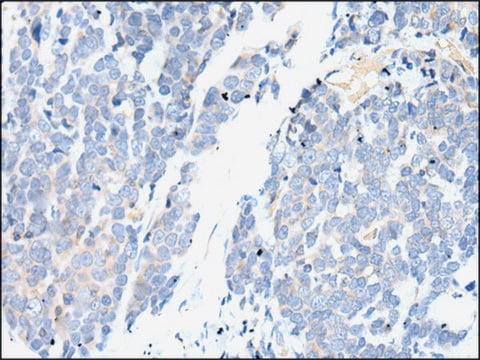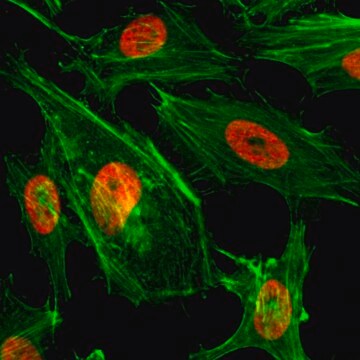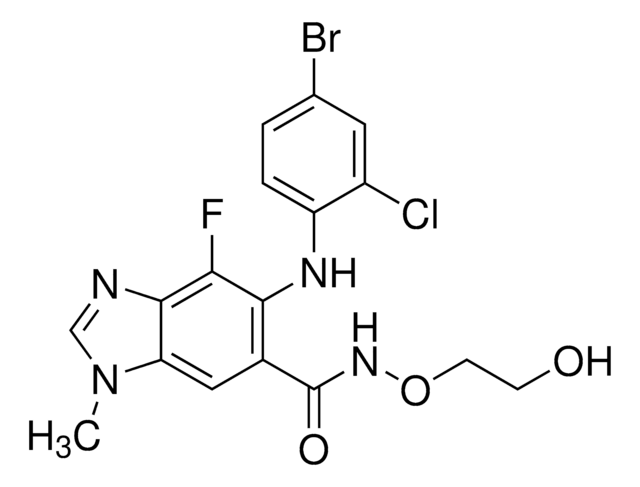Recommended Products
biological source
rabbit
Quality Level
antibody form
serum
antibody product type
primary antibodies
clone
polyclonal
species reactivity
human
manufacturer/tradename
Upstate®
technique(s)
western blot: suitable
NCBI accession no.
UniProt accession no.
shipped in
dry ice
target post-translational modification
unmodified
Gene Information
human ... SMC2(10592)
General description
SMC2 and SMC4 from the active ATPase subunit of Condensin I and Condensin II complexes that regulate chromosome compaction.
Specificity
SMC2/hCAP-E
Immunogen
KLH-conjugated, synthetic peptide corresponding to amino acids 1184-1197 (C-KSKAKPPKGAHVEV) of human SMC2/hCAP-E (Structural Maintenance of Chromosome 2/ Chromosome-Associated Protein E) with an N-terminal cysteine added for conjugation purposes.
Application
Anti-SMC2/hCAP-E Antibody is a high quality Rabbit Polyclonal Antibody for the detection of SMC2/hCAP-E & has been validated in WB.
Research Category
Epigenetics & Nuclear Function
Epigenetics & Nuclear Function
Research Sub Category
Cell Cycle, DNA Replication & Repair
Cell Cycle, DNA Replication & Repair
Quality
Routinely evaluated by immunoblot.
Target description
137kDa
Physical form
Serum
Storage and Stability
2 years at -20°C
Analysis Note
Control
Positive Antigen Control: Catalog #12-309, Hela cell nuclear extract. Add an equal volume of Laemmli reducing sample buffer to 10 μL of extract and boil for 5 minutes to reduce the preparation. Load 20 μg of reduced extract per lane for minigels.
Positive Antigen Control: Catalog #12-309, Hela cell nuclear extract. Add an equal volume of Laemmli reducing sample buffer to 10 μL of extract and boil for 5 minutes to reduce the preparation. Load 20 μg of reduced extract per lane for minigels.
Legal Information
UPSTATE is a registered trademark of Merck KGaA, Darmstadt, Germany
Disclaimer
Unless otherwise stated in our catalog or other company documentation accompanying the product(s), our products are intended for research use only and are not to be used for any other purpose, which includes but is not limited to, unauthorized commercial uses, in vitro diagnostic uses, ex vivo or in vivo therapeutic uses or any type of consumption or application to humans or animals.
Not finding the right product?
Try our Product Selector Tool.
Storage Class Code
10 - Combustible liquids
WGK
WGK 1
Certificates of Analysis (COA)
Search for Certificates of Analysis (COA) by entering the products Lot/Batch Number. Lot and Batch Numbers can be found on a product’s label following the words ‘Lot’ or ‘Batch’.
Already Own This Product?
Find documentation for the products that you have recently purchased in the Document Library.
Classification, subtype discovery, and prediction of outcome in pediatric acute lymphoblastic leukemia by gene expression profiling.
Yeoh, Eng-Juh, et al.
Cancer Cell, 1, 133-143 (2002)
Alexander Schleiffer et al.
Molecular cell, 11(3), 571-575 (2003-04-02)
We describe a superfamily of eukaryotic and prokaryotic proteins (kleisins) that includes ScpA, Scc1, Rec8, and Barren. Scc1 interacts with SMC proteins through N- and C-terminal domains to form a ring-like structure. Since these are the only domains conserved among
Mingxuan Sun et al.
Chromosome research : an international journal on the molecular, supramolecular and evolutionary aspects of chromosome biology, 26(4), 277-295 (2018-08-26)
During cell division, chromosomes must be folded into their compact mitotic form to ensure their segregation. This process is thought to be largely controlled by the action of condensin SMC protein complexes on chromatin fibers. However, how condensins organize metaphase
K Kimura et al.
The Journal of biological chemistry, 276(8), 5417-5420 (2001-01-04)
13S condensin is a five-subunit protein complex that plays a central role in mitotic chromosome condensation. The condensin complex was originally identified and purified from Xenopus egg extracts and shown to have an ATP-dependent positive supercoiling activity in vitro. We
J A Schmiesing et al.
Molecular and cellular biology, 20(18), 6996-7006 (2000-08-25)
Structural maintenance of chromosomes (SMC) family proteins play critical roles in structural changes of chromosomes. Previously, we identified two human SMC family proteins, hCAP-C and hCAP-E, which form a heterodimeric complex (hCAP-C-hCAP-E) in the cell. Based on the sequence conservation
Our team of scientists has experience in all areas of research including Life Science, Material Science, Chemical Synthesis, Chromatography, Analytical and many others.
Contact Technical Service





